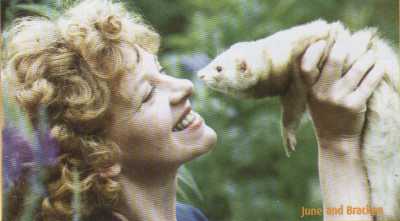Back to Basics - Golden Oldies
 Thanks to better care, feeding and treatment many ferrets now reach comparative old age. Veteran classes often have very high entry numbers and many ferrets aged six and above give the youngsters a run for their money in the racing classes. DR JUNE McNICHOLAS shows us how to give extra care and attention to our furry friends as they grow older.
Thanks to better care, feeding and treatment many ferrets now reach comparative old age. Veteran classes often have very high entry numbers and many ferrets aged six and above give the youngsters a run for their money in the racing classes. DR JUNE McNICHOLAS shows us how to give extra care and attention to our furry friends as they grow older.
(Photograph features June with Bracken who is at least seven years old.)
Although there's been a lot of research on the needs of older cats and dogs, especially in terms of nutrition, there is little, if any, advice on the needs of older ferrets. I've asked around my contacts in the vet and animal behaviour world and the people I regard as ferret experts have come up with these suggestions on how to make the later years of old friends happier, healthier and more comfortable.
The obvious possible change in needs is nutrition. We don't yet have 'senior' diets for ferrets in the same way as we do for cats and dogs but it is reasonable to suppose that the same pressures on older cat/dog digestive systems also apply to ferrets as they get older.
Quite simply their systems (like ours) lose a little bit of their efficiency with age. Digestion of food and the ability of the kidneys to deal with waste products are likely to reduce as an animal grows older. Cat and dog 'senior' diets tend to be slightly lower in protein and/or consist of very easily digested proteins such as poultry. Feeding recommendations for older animals usually move towards the 'little and often' regime to help digestive systems cope better.
Ferrets need a high protein diet so I wouldn't necessarily suggest lower than normal protein diets for older ferrets unless your vet feels this is necessary, such as where there are known kidney problems. However, older ferrets seem to do better on more fresh chicken/turkey/rabbit in their diets, plus their usual dry food fed ad lib. Encouraging little and often is also helpful.
Now, I firmly believe that ferrets of all ages are lazy when it comes to drinking water and this can cause problems for those with a high percentage of dry food in their diet. Older ferrets are even more likely to be lazy drinkers. It's been a bit of a soap-box thing with me for some time but I really believe that lots of digestive and kidney problems can be avoided if you give water bowls. Bottles are hard work (try it yourself!). Better still, give both - some to splash in, some to spill but still enough to drink freely! It's certainly an issue that many vets have raised and I've found it's been enormously useful for our old ferrets. A good rule of thumb is that a ferret tends to need to drink around 75ml-100ml of water daily.
Then there's accommodation. Again, like us, ferrets slow down (a bit!) as they age, and they can develop aches and stiffness. They also take longer to recover from illnesses and injuries. You might need to think about modifying accommodation such as taking out ramps or ladders, or making sure sleeping and feeding areas ar at levels they can easily reach without too much effort or risk of falling. We have single storey 'retirement bungalows' for our elderly residents. There can also be a problem where an older ferret lives with younger, more boisterous, companions. I was horrified when I realised that our old Griff was not bothering to push his way out of bed when he was under some of the others, and was less willing to insist on his position at the food bowls. Luckily, adding extra beds, hammocks and food bowls meant that we didn't have to resort to parting him from his friends, at least not so far.
And just a more general word on aches and stiffness. The obvious signs are lameness or slowness of movement, but if often depends on where the discomfort is. A ferret that has a stiff neck or shoulders may move around reasonably normally but he may find it uncomfortable to put his head down to his food bowl to feed. This can lead to gradual weight loss simply because the ferret finds it too uncomfortable to feed long enough to get adequate quantities. Using a raised bowl can work wonders because it eases the strain on neck and shoulders muscles.
It's easy to put aches and pains down to the inevitability of growing older, but this does not mean that they can't be treated. A lot of medications for rheumatism and arthritis in cats and/or dogs can be useful in ferrets, so it is worth talking to your vet to see if these aches and pains can be made easier to live with. Any of you who met my old line-hob Firkin may remember that he wore a 'magnapulse' collar for the last year of his life which really did help to ease the stiffness in his shoulders and allow him to bop with the best of them!
Teeth and nails may need extra attention during later years. Lack of appetite or loss of weight could be due to tooth or gum problems so frequent checks are necessary. Scaling of tartar or removal of decayed teeth may be necessary. This requires a general anaesthetic but there is little need for concern about this even in older ferrets. Many of our 10+ year olds have sailed through the comparatively light anaesthetic needed for dental treatment and it has certainly contributed to an improved quality of life. Nails in older ferrets need more frquent trimming, possibly because their activity level is lower. Make a point of frequent pedicures to avoid nails catching in bedding and causing foot injuries.
Finally, a word on failing senses. It's not unusual for eyesight to degenerate as a ferret gets older, and cataracts are quite common. This can leave the ferret with little more than a sense of light/shadow and movement but, since eyesight is less important to them than to us, most adapt very easily. Hearing can also degenerate, as can sense of smell and general sense of orientation. Again, the ferret can adapt quite well but you need to understand any changes in behaviour that might occur. For example, an old ferret with failing senses may be more inclined to nip if you suddenly disturb him from sleep or pick him up when he doesn't realise you are there. He hasn't got cranky with old age, you've just made him jump! Keeping funishings, bedding etc in the same places in his cage can help him know where everything is, and making sure you speak to him/knock on his bed or the floor before picking him up can prevent startling him.
For many of us, the later years of a ferret's life are just as rewarding as the younger, more playful, years. Older ferrets love a lap and quiet company and after years of playful companionship, entertainment, working, showing or PR, they owe us little. What we owe them is greater, and we need to remember that.
Painful though it is, the greatest responsibility we owe to our old friends is to know when to let go; when the 'bad days' outnumber the good; when illness means no hope. Then our worth as a responsible owner is put to the test. But until that time, the older ferret is a joy to own.
He may aquire a quiet dignity or he may grow old disgracefully but the health and happiness he enjoys in later life are our privileges to bestow.
